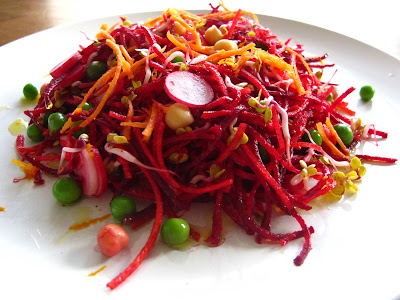Another glum day in London... As the sun is not shining
as it was supposed to be, I’m bringing the colours to my plate. With so many
beautiful and colourful roots in season, I decided to make a raw salad recipe
given to me by my talented friend and chef Breno Morais.
Breno, this one is for you! Thanks for leaving the
sunshine on a plate for us before you moved back to Brazil for good.
 |
| The garden peas are in season |
 |
| The ingredients |
 |
| My raw and super fresh salad |
 |
| Breno's powerful and colourful salad |
Powerful and colourful salad by Breno Morais
Serves
8 people
“It’s full of colours, healthy and light. When the taste of the roots mix with the
citrus of the orange in your mouth you will feel as you were in paradise.”
(Breno)
I have changed this recipe slightly. In the original, Breno uses Broad beans instead of peas and mustard sprouts instead of radish sprouts. This recipe is packed with nutrients.
INGREDIENTS
2 medium beetroot, grated
2 medium beetroot, grated
3 medium carrots, grated
1 bunch of radishes, sliced
Full hand of radish sprouts
150 g organic garden peas (Breno uses
broad beans. As I had fresh garden peas, I used them instead)
150 g organic chickpeas
Sea salt and black pepper
For the dressing:
50 ml olive oil
Zest and juice of 1 orange
Sea salt and black pepper
METHOD
In a small bowl, add the olive oil, the zest and juice of the orange and season.
In a small bowl, add the olive oil, the zest and juice of the orange and season.
In a bigger bowl, mix all the
ingredients with half of the dressing. Season. Pour the other half of the
dressing when you are ready to eat. Enjoy!
Some of the ingredients and their healthy
benefits
Beetroot (Beta vulgaris): It
contains betain, a nutrient that increases digestion and prevents heart and
liver diseases. Beetroot provides lots of fibre and that’s probably why it has shown to
improve bowel function - it moistens the intestines, relieving constipation and
regulates digestion. Studies have shown that beetroot strengthens the
heart, regulates cholesterol levels, lowers blood pressure and benefits the liver. Beetroot colours can show up even in your urine or
faeces, which is a harmless condition called beeturia.
The juice made with beetroot and carrot
is a perfect combination to regulate hormones and relieve the symptoms of menopause.
Beetroot is a great source of
betacarotene, vitamin B6, folic acid, manganese, silicon and potassium. It is
also is a very good source of iron, which can prevent anaemia, especially
for people who follow a vegetarian diet.
Beet greens have a higher concentration
of calcium, iron and vitamins A and C than beetroots. It’s high in sodium,
so little salt is required. Caution: Those
who suffer from kidney problems should avoid eating too much beet greens due to
its high oxalic content, as it inhibits calcium metabolism.
Carrot (Daucus carota): is high in carotenoid, an
antioxidant compound associated with many healthy benefits. It contains lutein and zeaxanthin (carotenoids
present in our retina), which is why carrots are famously known for being good
for your eyes. The carotenoid and vitamin A contents found in carrots are
fat-soluble vitamins - when eaten with a little fat (olive oil, coconut oil,
ghee etc), they are better absorbed by your body. They also provide good levels of
vitamin K, fibre, vitamin C, biotin, vitamins B1 and B6.
Chickpea or garbanzo (Cicer arietinum): it is the most
nutritious of all the legumes. It is very good for your pancreas, stomach and
heart. It is high in protein, fat and carbohydrate. It contains very good
levels of iron (more than other legumes), calcium, magnesium, potassium, zinc,
B vitamins and especially folic acid (B9). Sprouted chickpea contains vitamin C
and enzymes.
Peas (Pisum sativum): They are a source of protein,
carbohydrate and fibre. They’re mildly laxative. Strengths the spleen-pancreas
and stomach, and harmonizes digestion. Peas contain B vitamins, vitamin C magnesium,
vitamin K, potassium, iron and carotenes.
Radish (Raphanus sativus): it’s part of
the mustard family. Radishes used to be predominantly black and not red. They
contain high levels of vitamin C. They’re also high in fibre and water, which is
very beneficial for people with constipation. Black radish stimulates the bile production, liver
detoxification and the cleaning of the gallbladder, maintaining a healthy
digestive tract. It contains antibacterial properties that help to balance the digestive
flora. It treats coughs and fortifies lungs; and also helps to balance fatty or
oily food in the body.

No comments
Post a Comment